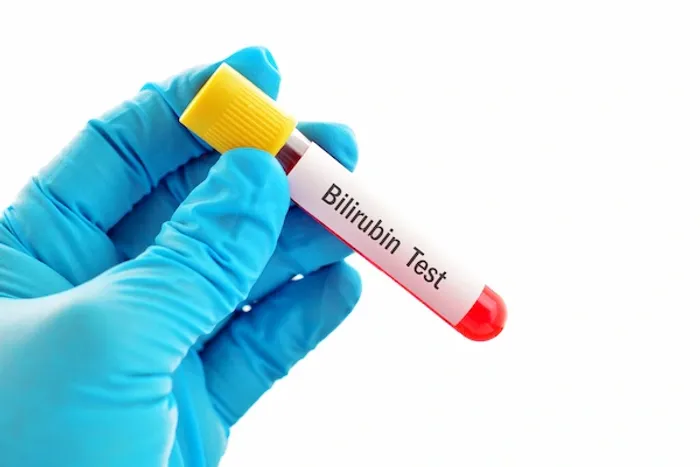Bilirubin Test and Its Result Interpretation
Understand the bilirubin test, why it’s done, and what the results mean. Learn how this test helps assess liver function and detect related health conditions.


Introduction
When you visit a doctor for a health check-up or if you're experiencing symptoms like yellowing of the skin or eyes (jaundice), your doctor may recommend a bilirubin test. This simple blood test helps assess liver function and diagnose conditions related to bile production and red blood cell breakdown.
If you’ve been asked to take this test or have received your results, you might be wondering what it all means. Don’t worry, we’ll break it down in simple terms so you can understand why this test is important, what the results indicate, and what steps you can take next.
What is Bilirubin?
Bilirubin is a yellowish pigment produced when old red blood cells break down. It’s processed by the liver and excreted through bile (a digestive fluid) into the intestines. Normally, bilirubin is removed from the body through stool, giving it its brown colour.
However, if the liver isn’t functioning properly or if there’s excessive red blood cell breakdown, bilirubin levels can rise, leading to jaundice and other health concerns.
Consult a Gastroenterologist for the best advice
Why is a Bilirubin Test Done?
A bilirubin test helps doctors:
- Diagnose liver diseases (like hepatitis or cirrhosis).
- Detect blockages in the bile ducts (gallstones or tumours).
- Monitor newborns for jaundice (common in babies).
- Assess conditions like haemolytic anaemia (where red blood cells break down too quickly).
If you have symptoms such as:
- Yellow skin or eyes (jaundice)
- Dark urine
- Pale or clay-coloured stools
- Fatigue or abdominal pain
Your doctor may order this test to determine the cause.
Types of Bilirubin Tested
The bilirubin test measures three main components:
1. Total Bilirubin – The overall amount of bilirubin in the blood.
2. Direct (Conjugated) Bilirubin – Bilirubin processed by the liver (should be low if the liver is healthy).
3. Indirect (Unconjugated) Bilirubin – Bilirubin before liver processing (high levels may indicate excessive red blood cell breakdown).
By comparing these values, doctors can identify where the problem lies, whether it’s in the liver, bile ducts, or red blood cells.
Understanding Your Bilirubin Test Results
Normal bilirubin levels vary slightly by lab, but generally:
- Total Bilirubin: 0.3 – 1.2 mg/dL
- Direct Bilirubin: 0.1 – 0.3 mg/dL
- Indirect Bilirubin: 0.2 – 0.9 mg/dL
What High Bilirubin Levels Could Mean
Bilirubin levels outside the normal range may signal underlying issues. Here’s what high bilirubin levels could mean.
1. High Indirect Bilirubin:
- Haemolytic anaemia (red blood cells breaking down too fast).
- Gilbert’s syndrome (a harmless genetic condition).
- Newborn jaundice (common in babies due to immature liver function).
2. High Direct Bilirubin:
- Liver diseases (hepatitis, cirrhosis).
- Bile duct blockage (gallstones, tumours, or inflammation).
3. High Total Bilirubin (with both direct and indirect elevated):
- Severe liver disease.
- Bile duct obstruction.
What Low Bilirubin Levels Mean
Low bilirubin is usually not a concern, but extremely low levels may be seen in certain rare conditions.
What Should You Do If Your Bilirubin is High?
If your test shows elevated bilirubin, don’t panic. Your doctor will help determine the cause and recommend next steps, which may include:
- Further tests (liver function tests, ultrasound, or CT scan).
- Medications (if an infection or liver disease is present).
- Lifestyle changes (if Gilbert’s syndrome or mild liver issues are detected).
Get Your Health Assessed
Tips to Support Liver Health
If your bilirubin is slightly elevated due to mild liver stress, consider these healthy habits:
- Stay Hydrated – Helps flush out toxins.
- Eat a Balanced Diet – Include fruits, vegetables, and whole grains. Avoid excessive fatty or processed foods.
- Limit Alcohol – Reduces liver strain.
- Exercise Regularly – Supports metabolism and liver function.
- Avoid Unnecessary Medications – Some drugs can affect liver enzymes.
For newborns with jaundice, doctors may recommend phototherapy (light treatment) to help break down excess bilirubin.
When to See a Doctor
Seek medical attention if you experience:
- Persistent jaundice
- Severe abdominal pain
- Dark urine or pale stools
- Unexplained fatigue or nausea
If you need a bilirubin test or liver function evaluation, you can easily book a test or consult a specialist through Apollo 24|7. Early detection and treatment can prevent complications.
Final Thoughts
A bilirubin test is a simple yet powerful tool to assess liver and bile duct health. While high levels can be concerning, they often point to treatable conditions. By understanding your results and working with your doctor, you can take the right steps toward better health.
Consult a Gastroenterologist for the best advice
Consult a Gastroenterologist for the best advice

Dr Rohit Sureka
Gastroenterology/gi Medicine Specialist
15 Years • MBBS, DNB General Medicine, DNB Gastroenterology
Jaipur
Apollo 247 virtual - Rajasthan, Jaipur

Dr. Umakanth Eskala
Gastroenterology/gi Medicine Specialist
16 Years • DM (GASTRO)
Visakhapatnam
Apollo 24|7 Clinic - Andhra Pradesh, Visakhapatnam

Dr Harish K C
Gastroenterology/gi Medicine Specialist
15 Years • MBBS MD DM MRCP(UK) (SCE-Gastroenterology and Hepatology)
Bangalore
Manipal Hospital, Bangalore

Dr. Paramesh K N
Gastroenterology/gi Medicine Specialist
16 Years • MBBS, MS ( General Surgery), DNB ( Surgical Gastroenterology)
Hyderabad
Sprint Diagnostics Centre, Hyderabad
Dr. Vijay Rai
Gastroenterology/gi Medicine Specialist
19 Years • MBBS,MD General Medicine,MD GASTROENTOLOGY
Kolkata
Livgastro, Kolkata
Consult a Gastroenterologist for the best advice

Dr Rohit Sureka
Gastroenterology/gi Medicine Specialist
15 Years • MBBS, DNB General Medicine, DNB Gastroenterology
Jaipur
Apollo 247 virtual - Rajasthan, Jaipur

Dr. Umakanth Eskala
Gastroenterology/gi Medicine Specialist
16 Years • DM (GASTRO)
Visakhapatnam
Apollo 24|7 Clinic - Andhra Pradesh, Visakhapatnam

Dr Harish K C
Gastroenterology/gi Medicine Specialist
15 Years • MBBS MD DM MRCP(UK) (SCE-Gastroenterology and Hepatology)
Bangalore
Manipal Hospital, Bangalore

Dr. Paramesh K N
Gastroenterology/gi Medicine Specialist
16 Years • MBBS, MS ( General Surgery), DNB ( Surgical Gastroenterology)
Hyderabad
Sprint Diagnostics Centre, Hyderabad
Dr. Vijay Rai
Gastroenterology/gi Medicine Specialist
19 Years • MBBS,MD General Medicine,MD GASTROENTOLOGY
Kolkata
Livgastro, Kolkata

